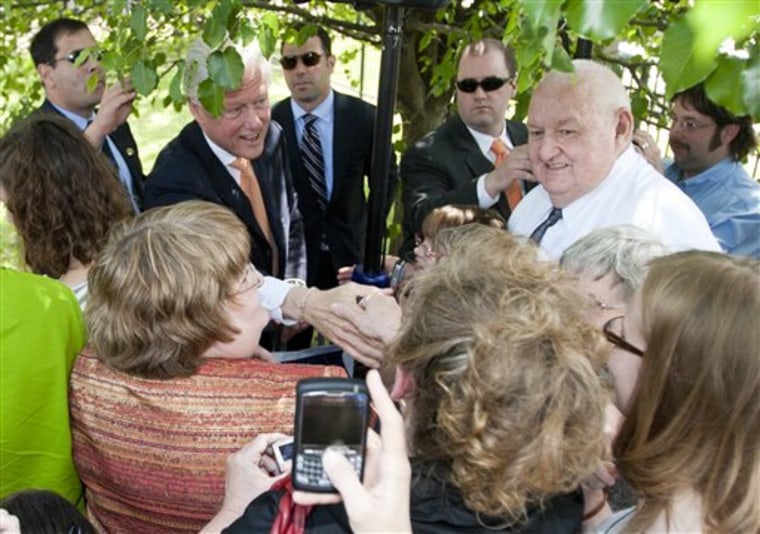Former President Bill Clinton dedicated his boyhood home in Hope on Saturday as part of the National Park Service, and he used the occasion to say that the country is having hard times because people are too focused on money and not enough on each other.
Clinton told about 400 people on a windy and sunny afternoon that growing up without a television led him to focus on people and the stories they told.
"We here of a certain age were raised to see everyone. My grandfather taught me to see people without regard for the color of their skin," Clinton said.
Clinton lived in the white, two-story home with his mother, Virginia, and her parents, Eldridge and Edith Cassidy, though the home remained the focus of Clinton's family life for years afterward. Clinton recalled that his grandfather would serve both black and white customers at his grocery store, an uncommon business practice during segregation.
"In many ways, I know that all I am or ever will be came from here," Clinton said.
The house and museum grounds are bordered by railroad tracks on two sides and Clinton, speaking with a hoarse voice, at times had to be heard above the locomotive whistles and rumbling of freight trains.
"I used to sit here and wonder where those trains were going, and I wondered if I'd ever get to go there. Now I just want to go home," Clinton said. "That may hurt your ears, but it's pretty to me."
He spent part of his talk greeting old friends in the audience and reminiscing about his youth, which led him to say that he's worried that budget problems in Washington, D.C., are being addressed without concern for the impact it will have on individuals.
"We've gotten away from being a people-centered society (and become) a money-centered society," he said, adding that a consequence is that the have-nots have even less because the rich continue to hold a disproportionate amount of the nation's wealth.
Clinton complained that budget policy is being dictated by ideologues bent on having a smaller government.
"I don't think there is an ideological answer," Clinton said. "I want everyone to have a philosophy. It can be a little bit liberal, a little bit conservative."
"There is a huge difference between having a philosophy and having an ideology. The people who made America had a philosophy," he said. "If you have an ideology you have the answer to the question before you look at the facts.'
Clinton said the "aspirations of ordinary" people are being overlooked as the nation tries to work through its budget woes.
Displays in the visitor center at the museum focus on how Clinton developed his values, and he said that his home now stands as "a symbol of a story."
"I hope some of the good I got out of being here will be somehow communicated' to people who visit, Clinton said.
Clinton began his talk by saying he was grateful that the storms that ripped across Arkansas the day before, killing seven people in the state, had passed. He recalled that when he dedicated the home when it opened as a museum in 1997, guests had to endure cold and rainy weather, as with the later dedication of his presidential library.
"The water was running over your shoes," recalled Sammy Crabtree, a member of the board of the Clinton Birthplace Foundation, which got the museum off the ground while Clinton was president.
Crabtree, speaking after Clinton's talk, said he bought the home in 1991 while Clinton was starting his run for president.
"I really couldn't answer why I did it," Crabtree said.
Crabtree said it was a fulfilling moment, watching Clinton step behind the lectern on Saturday.
"We have a chance to be involved in something that ends up in history," Crabtree said.
Among the dignitaries speaking before Clinton was Interior Secretary Ken Salazar, who said the purpose of the home is to tell the story of Clinton's youth while noting there is more to the mission.
"It's also about job creation and tourism," said Salazar, a former Democratic U.S. senator from Colorado.
Having the museum listed among national park properties is important to local officials and business owners, who hope the anticipated increase in visitors, will help the local economy. The house is three blocks from a scruffy downtown area that has more than its share of empty storefronts.
Paula Ledbetter of nearby Prescott, said there's a simple reason why the home will draw more visitors.
"People love President Bill Clinton. He was a great figure, a great public figure," she said.
A large number of visitors to the museum come from outside the U.S. Since opening, people from 159 countries have toured the grounds. Organizers have said that having the National Park Service listing will enable more people to learn of the home's existence and put it on their travel plans.
Already, Arkansas sees its share of Clinton tourists, who visit his library and museum next to downtown Little Rock. The home where he and Hillary Rodham Clinton lived in Fayetteville, when the future president was a law professor at the University of Arkansas, also has been converted to a museum.
Clinton spent the second half of his boyhood in Hot Springs, where he graduated from high school, which also has a number of Clinton-related sites.
